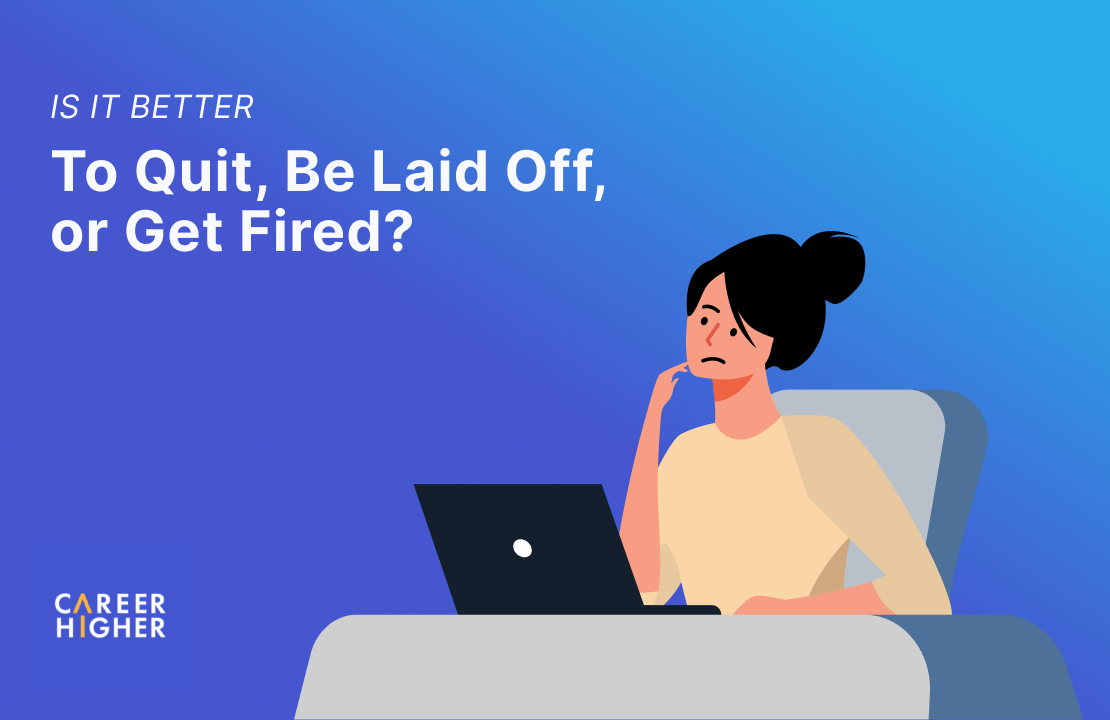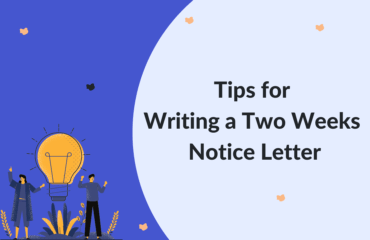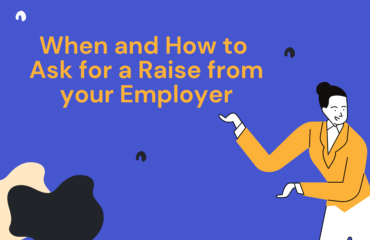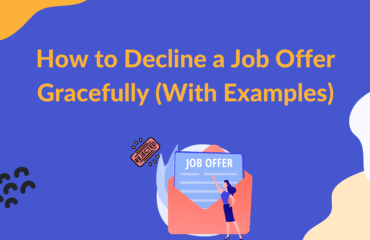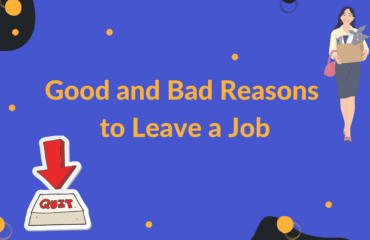Table of Contents
There may come a time in your professional life when you have to decide between quitting a job and waiting to be terminated. Leaving a job is never easy, no matter how you choose to do it. Your daily patterns can get disrupted, and you may feel insecure about the time ahead. The decision you make will significantly impact your future career prospects. This article discusses the implications of quitting, being fired, and being laid off and how you can decide the best option for you and your job search strategy.
The Difference Between Voluntary and Involuntary Termination
There are many ways in which the relationship between a company and an employee can end. You can quit, be fired, or be laid off. Understanding the characterization of each type of employment termination is vital, as it can have serious professional and financial implications.
Voluntary termination, also colloquially referred to as ‘resignation’ or ‘quitting’, occurs when an employee leaves a job by choice, perhaps for a personal reason or a better career opportunity. The employee initiates this type of termination, and usually, they have greater control over the fact and the timing of the separation.
Involuntary termination happens when an employer decides to discharge an employee from the company. The employer initiates the separation, and the employee doesn’t have a say in the matter. Based on the grounds of termination, it can further be classified into two types:
- Being fired: An employee can be fired or dismissed from the company for something the employer deems to be the employee’s fault. For example, a professional may be sacked because of poor performance, gross misconduct, insubordination, or other negative behavior. Thus, in this case, the employee’s own actions cause their termination.
- Being laid-off: Layoffs happen when the company decides to reduce its workforce because it no longer requires specific jobs. In these cases, the employer deems they are at fault, and termination isn’t a reflection of the employee’s abilities. Layoffs can happen due to auxiliary factors such as corporate restructuring, poor economic conditions, and the introduction of new technology.
Resignation (Voluntary Termination)
Signs you need to quit your job
Quitting a job is a crucial decision and should be carefully considered. Once you’ve handed in your resignation, there is usually no turning back. That said, there are situations beyond control where quitting may be the only viable option. Here are a few signs that you need to move on:
- Your career has stalled: If you find no opportunities for growth in your company and constantly feel unchallenged, you may have outgrown your job. Opportunities do not always mean promotions; they can also come in the form of new projects or responsibilities. Share your concerns with your manager, and if you still aren’t offered any new avenues for advancement, consider switching jobs.
- You are chronically stressed: If the thought of going to work gives you sleepless nights or provokes anxiety, you may be in a toxic job. You may have a demanding boss, an unhealthy work environment, or you cannot cope with the rigors of the role. If you continue working in such circumstances, you will likely spiral and burn out. Thus, if you cannot resolve the situation, you should look for other opportunities.
- You feel under-compensated: Sometimes, professionals accept lower pay for an exciting opportunity or greater flexibility. However, if you think you are significantly under-compensated, you should consider resigning. An unsatisfactory salary reflects a mismatch between what you and your employer perceive to be your worth. If you continue working in such a role, it could lead to resentment in the future.
What benefits do you have if you quit your job?
Resigning from a job has some advantages worth considering. One of the biggest perks is that it looks better on your resume than being fired. If you voluntarily leave a job, you tend to have greater control over your narrative. You can showcase your departure in a more positive light to prospective employers. For example, you can explain your decision by saying, “I left my previous job because there was no room for further growth.”
Secondly, you can quit your job on your terms. You can strategically plan for the big move beforehand. You can start looking for a new position before leaving your current one and ensure you are financially stable to withstand the change.
In the United States (US), when you quit for a ‘good cause’, you may be eligible for unemployment benefits. Besides, you may be entitled to retirement benefits and could qualify for COBRA insurance. In the United Kingdom (UK), you can claim benefits if you leave a job voluntarily. However, if you quit without a good reason, you may be penalized with a sanction for three months or longer. If you voluntarily leave a job in Canada, you will receive paid benefits if you leave for a just cause.
Also, when you leave a job on good terms, you can ask for a positive recommendation from your seniors. Even if you had an unpleasant experience at a company, you can gracefully quit your job and preserve professional conduct. By doing so, you can avoid any awkwardness, and you may be able to negotiate a later end date or severance pay.
How to resign from a job gracefully?
If you decide to quit your job, you should do so professionally and respectfully. It will help you maintain good relationships with your former co-workers and allow you to leave on a positive note. Here are a few tips on how to resign gracefully:
- Notify your manager: Once you decide to quit your job, you should inform your manager. We suggest notifying them in person. If you’re working remotely, speak with them on a phone call. In your conversation, mention why you plan to quit, when you intend to do so, and convey your sincere appreciation for the support they have provided you.
- Write a formal resignation letter: Submitting a resignation letter conveys formally to your company your decision to leave. The letter should include a statement of resignation, your last employment date, an expression of gratitude, and your contact details. Depending on your company’s policy, you may have to hand in a hard copy of the letter or send it via email.
- Ease the transition: As part of a graceful departure, you could create a document explaining your daily responsibilities for the next hire. You should also include your passwords, deadlines, or other crucial information to help your replacement smoothly transition into the role. Also, you can volunteer to train them before you leave.
Being Fired (Involuntary Termination)
Warning signs you are about to be fired
How do you know you are about to be let go? While some companies provide formal warnings or advance termination notice, others may take you by surprise. By identifying some critical signs, you can get ahead of the situation and prepare accordingly. Here are a few warning indications that you may be getting fired soon:
- Not enough work: If you notice that your workload has decreased considerably and your projects are being reassigned to others without a clear explanation, it could be because the company is planning your departure. You may also notice that your seniors aren’t asking for your input or seeking your help. You may suddenly find yourself with a lot of free time on your hands.
- Deteriorating relationships: You may feel your relationship with your manager is worsening, and your conversations with them have become highly formal and strictly business-related. You could also feel out of sync with the rest of your co-workers and find yourself excluded from team lunches or company events. This may be because your company is about to sever ties with you.
- Increase in the documentation: If you notice a sudden acceleration in the documentation about your actions, work, or statements, it is a warning sign. Most companies require managers to present valid documentation before firing an employee. If you are constantly being asked for information, it may be because your manager is gathering evidence to prove the cause for your termination.
What benefits do you have if you wait to be fired from a job?
While getting fired from a job is typically not advisable, there are some instances when waiting to be fired may be more beneficial than quitting. Depending on the circumstances of your termination and the country you worked in, if you are fired, you may be able to collect unemployment benefits. Sometimes, you may also be offered a severance package in exchange for waiving your right to file a suit against the company.
Suppose an employer in the US terminates you for reasons such as poor fit with the organization, incompetency, or failing to perform to specific standards. In such cases, you are likely to qualify for unemployment benefits. However, if you are fired for serious misconduct, such as theft, fraud, or sexual harassment, you will likely be disqualified for unemployment benefits.
Canada also follows a similar eligibility criterion for fired employees. On the other hand, in the UK, you can claim a number of benefits if you’ve been dismissed. If you are fired for misconduct, a benefit sanction of thirteen weeks or more may be imposed on you, after which you’ll be eligible for benefits.
If you expect to be fired soon, you can use your time wisely in your job search. Typically, companies prefer to hire candidates who are employed. Thus, your chances of receiving job offers and interviews increase considerably when you still have a job. Also, you’ll continue to receive your paycheck till the time you aren’t terminated, which can help you stay afloat. Thus, if you don’t have a job offer yet, it may make sense to hold on to your current job.
Being Laid Off (Involuntary Termination)
Warning signs you are about to be laid off
A company may have to cut down jobs for various reasons, and often there is little you can do to prevent layoffs. Some companies will communicate their poor financial forecast, while others may keep the employees in the dark. Here are a few warning signs that a layoff is coming:
- Your company brings in efficiency consultants: One of the first signs of an impending layoff is that your employer hires external consultants, especially if it’s a large organization. These consultants may be onboarded to manage process optimization, restructuring, and layoffs. Although the arrival of external consultants doesn’t always indicate termination, if you are asked questions about what you do and how you do it, they may be contemplating employee releases.
- Poor financial performance: If you work for a publicly traded company, we recommend following its quarterly earnings report. If you work in a private firm, you can gauge its financial condition through inter-office communications. If you notice financial losses or poor sales over a while, there is a good chance of a layoff. You should be on guard when you hear phrases such as ‘lower profits’, ‘implement cost-saving measures’, and ‘freeze all hiring’.
- Upper management is leaving: The senior management in a company is more privy to information than lower-level employees. They are likely to have a clearer understanding of the company’s future. Thus, if you observe the top-level executives jumping ships, it could signify that company-wide layoffs are fast approaching.
What benefits do you have if you are laid off from your job?
When a company lays you off, you may be entitled to a severance package. A severance package refers to the pay and benefits employees receive when the employer terminates them without their will. In some countries like the UK and Canada, employers typically have to provide mandatory redundancy pay to laid-off employees. However, in the United States, federal laws don’t require employers to provide severance. In any case, many companies still opt to do so as a goodwill gesture and to protect their brand.
You will typically have no trouble claiming unemployment benefits when you are laid off since you lost your job due to no fault of your own. The unemployment compensation can help you get by when you’re out of work. The amount offered in unemployment benefits vary from country to country.
When you suspect a layoff is coming, you can invest your time and efforts in looking for new opportunities. As mentioned earlier, your employability tends to increase when you have a job. Moreover, you can interview more confidently and avoid difficult conversations about why you quit. Once you’ve been laid off, your employer may also offer to refer you to another company.
How To Decide Whether To Quit Or Wait To Be Terminated?
How you choose to exit from your job is a decision you must take carefully. We suggest weighing the pros and cons of each course of action before making a choice. Here are a few factors you should take into account to make the right decision:
1) Evaluate your future employment prospects
Start by considering what your career looks like in the future. If you have already secured a job, resigning than waiting to be terminated may make more sense. However, if you haven’t found a job yet, holding onto your role could give you more time to look for new opportunities while still getting paid.
It would also be helpful to consider the impact of being fired on your job application, as some companies could be skeptical of hiring a candidate who has been sacked. Lastly, research the target job market and your industry. Evaluate if your skills are in high demand and if you’ll be able to find a job quickly. If you feel you are in a secure position, you may be better off quitting.
2) Decide what’s financially feasible for you
Before taking the big step, look at your company’s policy and find out the financial implications of each type of termination. Typically, unemployment benefits aren’t available to an employee who quits. If you are a young professional, you may not have enough financial savings to withstand the change. In such cases, hanging on to your job until you are terminated could be better. In some cases, you may even receive severance pay.
3) Assess your professional relationships
Before deciding what to do, you should also consider your professional relationships at your workplace. For some jobs, you may require a reference from your manager so, you’ll want to leave on good terms. If you resign gracefully and professionally, you could maintain a positive relationship with them.
4) Check your mental health
One of the most crucial factors to keep in mind is your mental health. If your job makes you miserable, it might be better to quit than to wait to be dismissed. A toxic job can have serious implications on your mental and physical health. Sometimes, a work situation is so bad that it doesn’t make sense to stick around, regardless of the consequences. So, reflect on your reasons for quitting and assess how your job is affecting you.
To make a choice between quitting or being terminated, clearly understand your options and evaluate the consequences of each alternative in the context of your situation. It is recommended to refer to the laws of your state and your company’s policies to fully understand the implications of each type of termination. If you’re confused about how to make a decision, seek advice from someone you trust or reach out to a career consultant.
